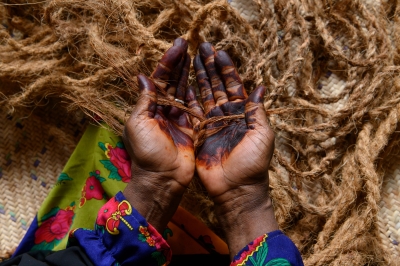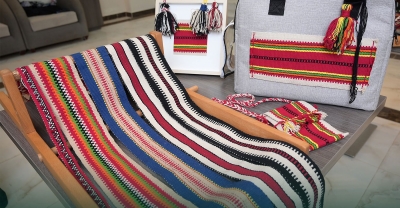
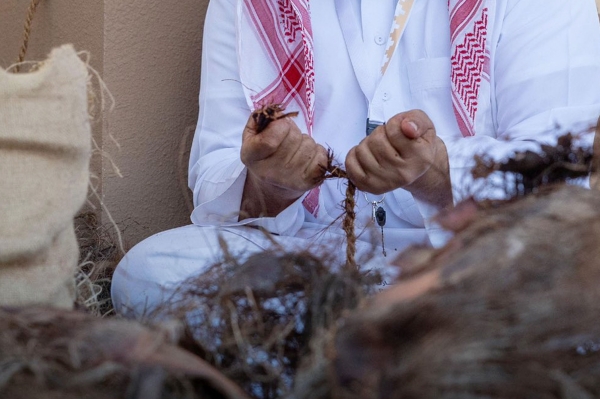
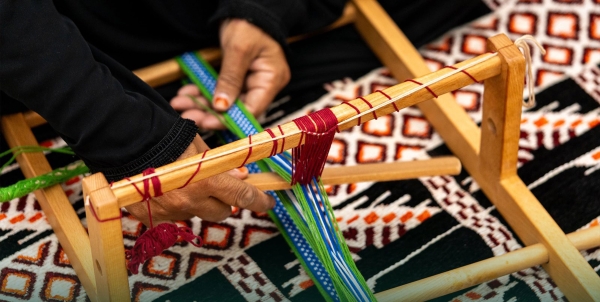
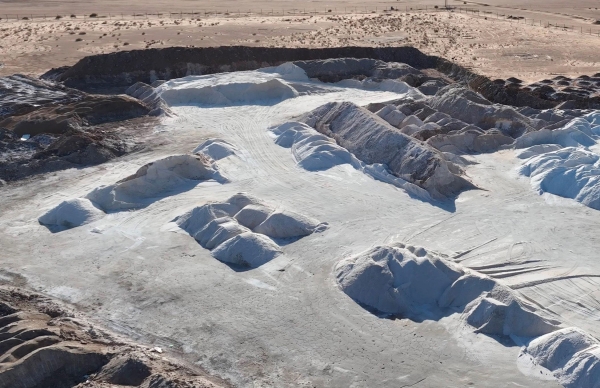
Handicrafts in Al-Jawf Province are the crafts, trades, and manual industries for which Al-Jawf Province, located in the north of the Kingdom of Saudi Arabia, is known. These crafts emerged to meet the needs of the province’s residents by utilizing raw materials available in its natural environment. They have been passed down through generations as part of the cultural heritage of the province’s inhabitants.
Al-Sadu craft in Al-Jawf Province
Al-Sadu is a craft predominantly practiced by women, involving the weaving of hair, wool, and camel hair to produce various items such as tents (Buyut Al-Sha’ar), carpets, rugs, cushions, armrests, saddlebags, storage pouches, water skins, slings, headbands, and decorative tassels. Woven garments include Al-Jawf cloak, embroidered silver-threaded cartridge belts, and woolen cloaks made from wool imported from Iraq.
Al-Sadu products are also used for decorating homes, traditional gathering spaces, and camps. They are incorporated into the making of women’s handbags and horse and camel ornaments, such as bridles and chest straps (Al-Shmal).
Several tools are used in Al-Sadu weaving, including the spindle, loom, and wooden instruments, such as Al-Minfash, a wooden beater lined with nails used to separate wool after collection, washing, and drying. The spinning process then begins, transforming the wool into twisted threads before continuing with the remaining Al-Sadu weaving stages.
The craft of Al-Sadu involves multiple stages, beginning with shearing goat hair, sheep wool, or camel hair, followed by sorting and washing with soap or ash to remove impurities. The fibers are then dried, spun, and dyed using natural colors extracted from plants, bark, and tree roots. The dominant colors in Al-Sadu weaving are black, white, red, and brown. The pieces are adorned with patterns and decorations, such as rectangles, circles, and triangles. In 2020, Al-Sadu weaving was inscribed on the United Nations Educational, Scientific, and Cultural Organization (UNESCO) Representative List of Intangible Cultural Heritage.
Rope twisting craft in Al-Jawf Province
Rope twisting is a craft that relies on parts of the date palm, a tree widely cultivated in Al-Jawf, making the province one of Saudi Arabia’s key regions for palm farming. Various products are made from twisted palm fibers, including Al-Sufrah, a mat woven from palm fronds, and Al-Hassir, a mat similar to a carpet, also made from fronds. Another product is Al-Zanbil, a basket with two handles used for carrying items, and Al-Matbaqiyah, which resembles Al-Zanbil but has a lid for storing goods. Additionally, cages made from palm midrib sticks, stripped of their fronds, are used for storage and transportation, while Al-Milqatah, a round basket with a fiber rope handle, is used for collecting Al-Rutab and Al-Tamr.
Other products of the rope-twisting craft in Al-Jawf Province include Al-Mansaf, a dish used for holding wheat and bread, and hand fans, which were traditionally called Al-Mahafah. Another product is Al-Majd, a container made from palm fronds with two handles, in which clusters of Al-Rutab and Al-Tamr are placed, tied with a rope, and then lowered from the top of the palm tree to the ground. Al-Mihbash, made from palm trunks, is used for crushing and grinding grains. Al-Tamr station, made from palm fronds and midrib sticks, has a circular shape with two compartments: a smaller one for Al-Rutab and Al-Tamr and a larger one for date pits. It has a base, as well as a woven palm frond basket for carrying items. Palm trunks are also used as roofs for houses and bird traps. Dried palm clusters are repurposed as brooms, while Al-Manshah is used to repel insects. Al-Khass serves as a partition or wall, and Al-Fatiyyah, which resembles a large tray with a lid, comes in different sizes.
Salt extraction craft in Al-Jawf Province
Salt extraction is a historical profession for which the town of Kaf in Al-Qurayyat Governorate, Al-Jawf Province, is known. This is due to the presence of a large dry salt lake in the area, from which salt was historically exported to neighboring towns and as far as Bosra, Hauran, and Jabal Al-Druze in the Levant.
Soap making craft in Al-Jawf Province
Due to the abundance of olive trees in Al-Jawf Province, the craft of soap-making from olive oil developed. This type of soap is considered among the finest, as its ingredients are natural and offer health benefits for the body.
Other crafts in Al-Jawf Province
Al-Jawf Province is known for several other trades, including mud-brick construction, carpentry, beekeeping, silk production, tanning, and blacksmithing, in addition to extracting molasses from dates, preparing butter and cheese, drying fruits, processing Al-Samah seeds, and making perfumes and bags. The province is also renowned for crafting daggers and swords, as well as jewelry making.
Related quizzes
Related articles
